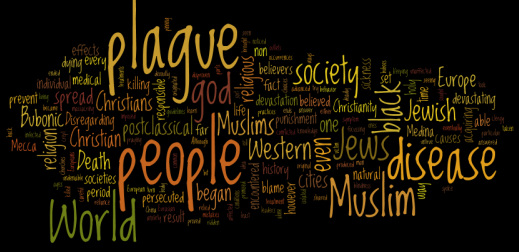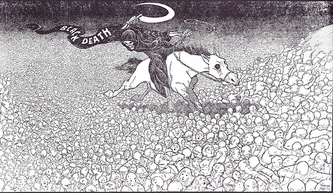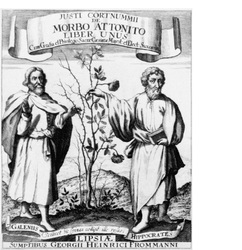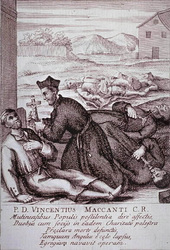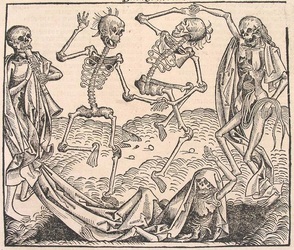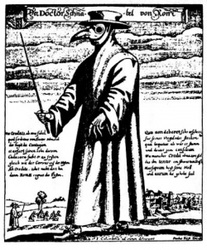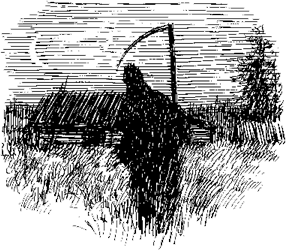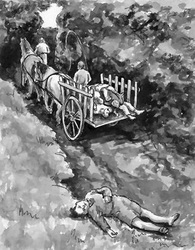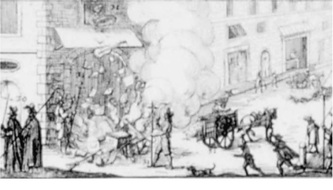A History of the World Through Diseases
The Postclassical Era
(600 CE-1450 CE)
While the Bubonic Plague originated in China during the postclassical period, the disease reached opposite ends of the Eurasian land mass creating the most devastating effects the world had ever seen up until this point in history. Keeping in mind that the postclassical period in history was a time of prosperity for exchange and trade, this provided the perfect conditions for what became know as the “Black Death” to spread its way through this region of the world. When focussing more specifically on Western Europe and the Muslim World, it’s undeniable that both societies associated the sickness with their religion, Christianity proved to be a set back for any medical advancements while the Muslims were able to learn and further prevent the spread of the plague. Culturally however, the societies shared a common blame towards Jews for the original causes of the plague.
Christianity dominated the very lives of everyone during the middle ages in Western Europe. It was the center of which their very society relied on. It was only natural that when the bubonic plague crept its way into europe that we see a reflection of christian ideas. Religious leaders began to feed the idea that if one contracted the deadly disease that it was a form of individual punishment from god for ones sins. A person was responsible for acquiring the sickness for making poor choices in their life that conflicted with Christian morals. As a result they suffered the consequences from god. Disregarding the fact that even the clergy of the churches were commonly dying from the pandemic, they emphasized that it was punishment from god for unchristian like behavior. When people began to turn to religion even more for help from the plague by praying devoutly, they began to question the true causes of the disease when their prayers were not answered. This reliance on religion for an answer led to a certain blindness in looking for real treatments to the disease.
In the Muslim World however, people saw the devastating effects of the plague as just another natural devastation brought on by god to the population as a whole, not for individual mistakes. For this reason, muslims sought medical answers for treatment to the disease that was rapidly killing their society. One physician in particular Al-Khatib spoke against any religious taboos initially imposed, pointing out that people isolated from the disease ridden people (such as North African tribes), were unaffected by the fatal plague. Muslim doctors were very careful to record every symptom the victims encountered such as fevers, rapid pulses, shivering, anxiety, black spots. They noticed not every single victim encountered the same symptoms before eventually dying. Muslim physicians were able to produce a set of guidelines to try to prevent acquiring the black death and prolonging the life of those already infected. Although most practices have today been disproven, one that was effective was surgically removing the black buboes which the body produced from the infection. These scientific outlets advanced the knowledge of the plague far more than the religious routes the Western Europeans had taken.
The Muslim World and Christian Society both persecuted Jews for having to do with some sort of cause of the Black Death. Muslims were promised in the Koran that both the cities of Mecca and Medina would not be touched by disease, seeing as how they are both very important holy cities in the Islamic faith. At the time of the first occurrences of the plague in the Muslim World they of course spread to Mecca and Medina both. As mentioned before people believed that this plague was from god on man kind and they related this to the existence of non believers in their holy lands (non believers being Jews) They believed that by Jewish people living in their most sacred cities, that god caused a devastation as a result. Christians also persecuted the Jewish people by believing that the devil willed the Jews to poisson the wells from which people got their water from. Both accusations from both parts of the world are inaccurate and untrue. Jews were obviously not in the least bit responsible for any doing, especially when you take into account the fact that even Jewish people were being killed by the plague.This evidence did not stop either the Christians or Muslims from pinning blame to Jewish people. Christians even went as far as massacring Jews blatantly disregarding age and sex.
The Bubonic Plague took its toll on both the Western European society and the society of the Muslim World. It seems that existing cultures of these regions affected the ways each of them decided to react to the disease that ended up killing up to 35 million people in the Postclassical era alone.
This video simply puts into perspective just how many people died as a result of the Bubonic Plague and the most obvious and major impacts it had on societies. It was professionally created by The History Channel UK who make brief videos on major events in history.
Helpful Sources
Secondary Source:
"Like sculpted and painted medieval visions of hell meant to scaremedieval Christians straight, literary works containing the threat or horrors of plague time carried with them a grim moral message ofhuman sinfulness, divine anger, and the necessity of repentance andchange of life. Just as medieval artists conveyed the point that sin ledto hell, early modern plague writers almost invariably intoned that sin-ners and sinful societies brought down upon themselves divine wrathand the Black Death, truly a hell on earth. Writers used every literary form and technique at their disposal to link their moralizing with the extraordinary experiences of plague time."- Joseph P. Byrne describes the tie religion has to the Black Death in his book Daily Life During the Black Death. Understanding the religion of the effected areas of the world helps us understand how they reacted to the plague.
Current Event Story:
Copy and paste the link below:http://www.sciencedaily.com/releases/2010/11/101105151012.htm
Through recent discoveries about the bubonic plague, scientists have been able to map out the origins of the deadly disease, and how it traveled its way through Asia all the way to Europe. The degree of interactions and trade during this period of time such as the Silk Roads led to an easy exchange of the plague.
